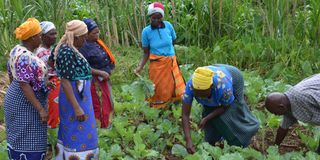Home gardens save Wundanyi residents from malnutrition

Members of Sere Kiziki Self Help Group at their vegetable farm in Taita Taveta County.
With the high cost of living, Ms Jackline Wakesho adopted a kitchen garden project to cushion her family from food shortages.
At her home in Kiziki, Taita Taveta County, she has planted assorted vegetables including kales, managu, spinach and other local varieties in a bid to enhance her household food security and nutrition.
"I used to spend Sh60 daily on vegetables. Now I get them from my garden so I can save the money for other expenses," she said.
Ms Wakesho, a smallholder farmer, says sometimes she didn’t have money to buy vegetables thereby risking exposing her children to malnutrition.
Her garden, she says, has also served as a source of income as she can sell the surplus vegetables to her neighbours.
"The little money I get from the vegetables I buy other foodstuffs and also it helps me to pay school fees for my children," she said.
She is among villagers from Kiziki, Sighulu, Chome and Kirema villages who have set aside a small portion of their farms to plant various types of vegetables.
The project that has benefited over 500 villagers aims at countering food insecurity and strengthening local food production to mitigate the adverse effect of high prices.
Sere Kiziki Self Help Group chairperson Grace Sau said all those who adopted the project since January have appreciated it since they are cushioned from the prohibitive food prices.
"The money they save from what they used to buy vegetables is now being channelled to other uses," she said.
Mshai Mcharo, from Chome, said villagers can save the money they spent on vegetables every day.
"We were buying vegetables at the Wundanyi market but now the money will be spent on other needs. This project will help women and youth and eventually create employment," she said.
The chairperson of the project, Caroline Mwanguku, said they have planted over 5,000 seedlings of tomatoes, onions, managu, mchicha and kales that will be transplanted to member's farms once they mature.
"Right now the impact is being felt. We came up with bankable proposals for livelihoods and food security to be strengthened," she said.
The project is set to be replicated in other villages across the county to economically empower as many villagers as possible.
"Those who produce more than what they can consume, they sell them. We want to increase production to achieve an economic turnaround for these villagers. Ultimately, we want this area to be a modern village," she said.
Farmers, however, face a challenge getting seedlings, fertilisers and other farm inputs because they cannot afford them.
Apart from the vegetable project, villagers have benefited from a fast-maturing maize variety from South African company Seedco.
She said the variety will cushion farmers from the effects of climate change that has affected rain patterns in the area.





